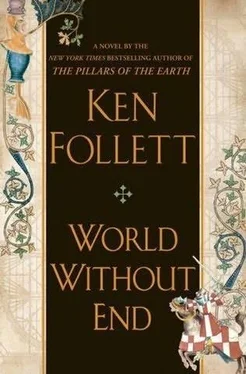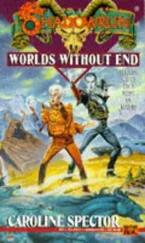When the nuns returned to the hospital after the funeral, there was nothing to do.
Caris washed her face, brushed her hair and put on the new dress she had been saving for this day. It was the bright red of Kingsbridge Scarlet. Then she walked out of the hospital for the first time in half a year.
She went immediately into Merthin’s garden.
His pear trees cast long shadows in the morning sun. The leaves were beginning to redden and crisp, while a few late fruits still hung on the boughs, round-bellied and brown. Arn, the gardener, was chopping firewood with an axe. When he saw Caris he was at first startled and frightened; then he realized what her appearance meant, and his face split in a grin. He dropped his axe and ran into the house.
In the kitchen, Em was boiling porridge over a cheerful fire. She looked at Caris as at a heavenly apparition. She was so moved that she kissed Caris’s hands.
Caris went up the stairs and into Merthin’s bedroom.
He was standing at the window in his undershirt, looking out at the nver that flowed past the front of the house. He turned towards her, and her heart faltered to see his familiar, irregular face, the gaze of alert intelligence and the quick humour in the twist of his lips. His golden-brown eyes looked lovingly at her, and his mouth widened in a welcoming smile. He showed no surprise: he must have noticed that there had been fewer and fewer patients arriving at the hospital, and he would have been expecting her to reappear any day. He looked like a man whose hopes have been fulfilled.
She stood beside him at the window. He put his arm around her shoulders, and she put hers around his waist. There was a little more grey in his red beard than six months ago, she thought, and his halo of hair seemed to have receded a little farther, unless it was her imagination.
For a moment, they both looked out at the river. In the grey morning light, the water was the colour of iron. The surface shifted endlessly, mirror-bright or deep black in irregular patterns, always changing and always the same.
“It’s over,” Caris said.
Then they kissed.
*
Merthin announced a special Autumn Fair to celebrate the reopening of the town. It was held during the last week of October. The wool-dealing season was over, but anyway fleeces were no longer the principal commodity traded in Kingsbridge, and thousands of people came to buy the scarlet cloth for which the town was now famous.
At the Saturday-night banquet that opened the fair, the guild honoured Caris. Although Kingsbridge had not totally escaped the plague, it had suffered much less than other cities, and most people felt they owed their lives to her precautions. She was everyone’s hero. The guildsmen insisted on marking her achievement, and Madge Webber devised a new ceremony in which Caris was presented with a gold key, symbolizing the key to the city gate. Merthin felt very proud.
Next day, Sunday, Merthin and Caris went to the cathedral. The monks were still at St-John-in-the-Forest, so the service was taken by Father Michael from St Peter’s parish church in the town. Lady Philippa, countess of Shiring, showed up.
Merthin had not seen Philippa since Ralph’s funeral. Not many tears had been shed for his brother, her husband. The earl would normally have been buried at Kingsbridge Cathedral but, because the town had been closed, Ralph had been interred in Shiring.
His death remained a mystery. His body had been found in a hunting lodge, stabbed through the chest. Alan Fernhill lay on the floor nearby, also dead of stab wounds. The two men appeared to have had dinner together, for the remains of a meal were still on the table. Obviously there had been a fight, but it was not clear whether Ralph and Alan had inflicted fatal wounds on one another or someone else had been involved. Nothing had been stolen: money was found on both bodies, their costly weapons lay beside them, and two valuable horses were cropping the grass in the clearing outside. Because of that, the Shiring coroner inclined to the theory that the two men had killed one another.
In another sense, there was no mystery. Ralph had been a man of violence, and it was no surprise that he had died a violent death. They that live by the sword shall die by the sword, Jesus said, although that verse was not often quoted by the priests of King Edward III’s reign. If anything was remarkable, it was that Ralph had survived so many military campaigns, so many bloody battles, and so many charges by the French cavalry, to die in a squabble a few miles from his home.
Merthin had surprised himself by weeping at the funeral. He wondered what he was sad about. His brother had been a wicked man who caused a great deal of misery, and his death was a blessing. Merthin had not been close to him since he murdered Tilly. What was there to mourn? In the end, Merthin decided he was grieving for a Ralph that might have been – a man whose violence was not indulged but controlled; whose aggression was directed, not by ambition for personal glory, but by a sense of justice. Perhaps it had once been possible for Ralph to grow into such a man. When the two of them had played together, aged five and six, floating wooden boats on a muddy puddle, Ralph had not been cruel and vengeful. That was why Merthin cried.
Philippa’s two boys had been at the funeral, and they were with her today. The elder, Gerry, was Ralph’s son by poor Tilly. The younger, Roley, was believed by everyone to be Ralph’s son by Philippa, though in fact he was Merthin’s. Fortunately, Roley was not a small, lively redhead like Merthin. He was going to be tall and dignified like his mother.
Roley was clutching a small wooden carving, which he presented solemnly to Merthin. It was a horse, and he had done it rather well for a ten-year-old, Merthin realized. Most children would have sculpted the animal standing firmly on all four feet, but Roley had made it move, its legs in different positions and its mane flying in the wind. The boy had inherited his real father’s ability to visualize complex objects in three dimensions. Merthin felt an unexpected lump in his throat. He bent down and kissed Roley’s forehead.
He gave Philippa a grateful smile. He guessed she had encouraged Roley to give him the horse, knowing what it would mean to him. He glanced at Caris and saw that she, too, understood its significance; though nothing was said.
The atmosphere in the great church was joyful. Father Michael was not a charismatic preacher, and he went through the mass in a mumble. But the nuns sang as beautifully as ever, and an optimistic sun shone through the rich dark colours of the stained-glass windows.
Afterwards they walked around the fair in the crisp autumn air. Caris held Merthin’s arm and Philippa walked on his other side. The two boys ran on ahead while Philippa’s bodyguard and lady-in-waiting followed behind. Business was good, Merthin saw. Kingsbridge craftsmen and traders were already beginning to rebuild their fortunes. The town would recover from this epidemic faster than from the last.
Senior members of the guild were going around checking weights and measures. There were standards for the weight of a woolsack, the width of a piece of cloth, the size of a bushel and so on, so that people knew what they were buying. Merthin encouraged guildsmen to perform these checks ostentatiously, so that buyers could see how carefully the town monitored its tradesmen. Of course, if they really suspected someone of cheating, they would check discreetly and then, if he was guilty, get rid of him quietly.
Philippa’s two sons ran excitedly from one stall to the next. Watching Roley, Merthin said quietly to Philippa: “Now that Ralph has gone, is there any reason why Roley should not know the truth?”
Читать дальше












